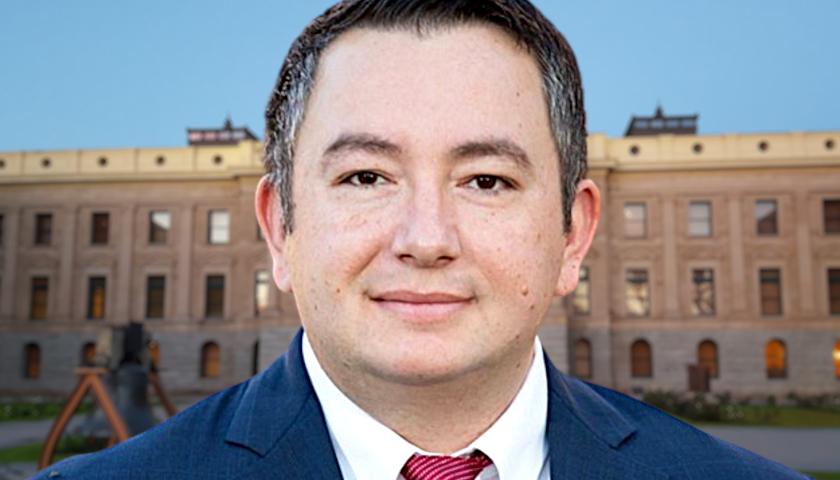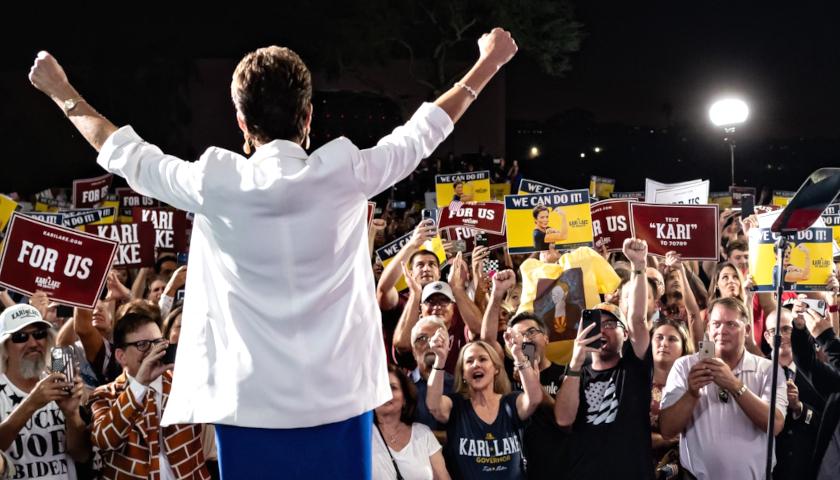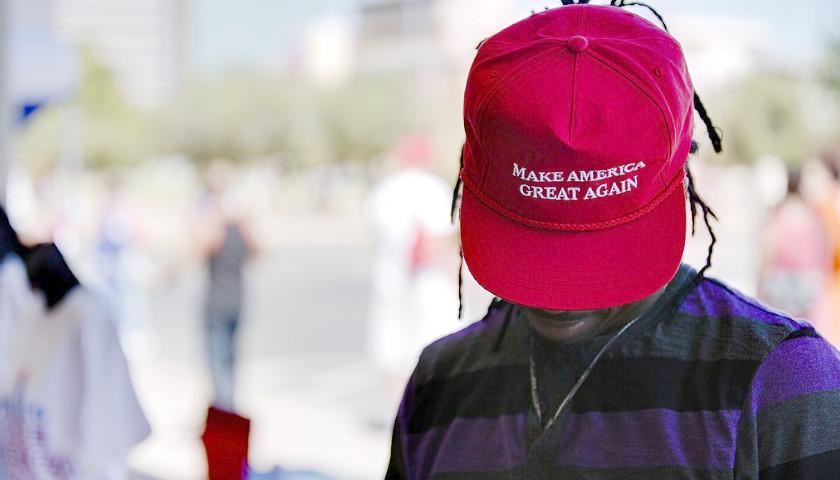Considerable scrutiny has been placed on the State Bar of Arizona recently following its decision to pursue investigations and disciplinary actions against attorneys representing clients and causes associated with the Republican Party – particularly election attorneys. The Arizona bar is investigating and has found probable cause against Kari Lake’s attorney Bryan Blehm, and he expects they will disbar him. Former Maricopa County prosecutor April Sponsel recently underwent a disciplinary trial for charging violent Antifa rioters with gang charges, and is waiting to find out if the bar’s disciplinary judge will suspend her license for two years.
The Arizona bar, like 31 other state bars, is a mandatory bar, which it switched to in 1933. This means in order to practice law in Arizona, attorneys are required to be a member. But the requirement to join, some argue, puts Arizona afoul of right-to-work provisions in state law, since many view it as illegally mandating attorneys join a union.
The Goldwater Institute has sued state bars to try and break up the mandatory nature, focusing on the aspect that the bars use the dues to engage in political conduct, violating the First Amendment. Last week, the U.S. Court of Appeals for the Fifth Circuit sided with the Goldwater Institute, ruling that Louisiana must stop forcing New Orleans attorney Randy Boudreaux to pay mandatory bar association dues as a condition of practicing law. The court held that an attorney cannot be compelled by the state to pay dues to a state bar association that engages in any activities that are not “inherently connected” to regulating the legal profession or improving the quality of legal services.
The court stated that the Louisiana State Bar Association took positions on political issues including “antidiscrimination laws for LGBT individuals, compliance with a state equal pay act, a rewriting of the state’s high school civics curriculum, a moratorium on executions in Louisiana pending certain criminal justice reforms, licensure of midwives, and concealed carry by school officials.”
However, the court observed that the Louisiana bar “does not admit, license, or directly discipline lawyers in Louisiana,” which are inherently connected to the practice of law. The Arizona bar does engage in those activities, so this decision could not be used to fully dismantle its mandatory nature.
In the states that don’t have a mandatory state bar, or where the bar only handles limited activities like the Louisiana bar, the licensing and discipline is handled by the state supreme court, an entity under it, or a separate state agency. Critics worry that even if mandatory state bars are dissolved, those entities will still be rife with abuse.
For example, in New York, where the state bar is voluntary, the New York Supreme Court indefinitely suspended Rudy Giuliani’s law license in connection with his representation Donald Trump in his 2020 election challenges.
The American Bar Association (ABA) has no authority over attorneys, since the licensing and discipline is all handled at the state level. However, it has tremendous influence over state bars, and the state bars usually adopt its draft disciplinary rules. Many of those rules are broad, vague, catchall rules that can be made to fit any activity by an attorney that goes against popular opinions.
Ethical Rule 8.4 of the Arizona Rules of Professional Conduct states in part that it is professional misconduct to “engage in conduct involving dishonesty, fraud, deceit or misrepresentation” or “engage in conduct that is prejudicial to the administration of justice.” This is being used against attorneys assisting with election challenges.
ER 8.2 prohibits an attorney from making a statement “that the lawyer knows to be false or with reckless disregard as to its truth or falsity concerning the qualifications or integrity of a judge, adjudicatory officer or public legal officer, or of a candidate for election or appointment to judicial or legal office.” This was used against the conservative former Maricopa County Attorney Andrew Thomas after he held a press conference criticizing Maricopa County Superior Court judges for circulating a memo among themselves stating not to enforce a proposition he had helped get passed with 77 percent voter support. The measure forbade bail for illegal immigrants accused of committing serious crimes.
Like other state bars, much of the leadership of the Arizona bar is made up of attorneys from among the largest law firms in the state, which are often known for their representation of Democratic organizations and causes.
Another frequent criticism leveled at the State Bar of Arizona is that the powerful body acts as an arm of the government but without the transparency required of government. The Arizona Supreme Court delegated to the nonprofit essentially a monopoly over the legal profession, but since it’s ostensibly a private association, it is not subject to public records requests.
The Arizona bar is governed by a 30-member board of governors, which includes mostly elected attorney members, plus a few appointed members, and members of the public. None of the 30 appear to have a record of representing Republicans or broadly conservative causes.
Board of governors member Robert McWhirter frequently attacked Thomas, who the Arizona bar ultimately disbarred in 2012 related to his efforts with former Maricopa County Sheriff Joe Arpaio rooting out corruption within the Maricopa County Supervisors and stopping illegal immigration. The board of governor’s most recent meeting minutes reflect that McWhirter remains heavily involved in much of the Arizona bar’s administration. He ran unsuccessfully for Maricopa County Attorney in 2020 and attorney general in 2022.
According to the Arizona Daily Independent, McWhirter, along with other Arizona bar leadership and The 65 Project, filed complaints against numerous conservative election attorneys. Those named in the filing included State Representative Alex Kolodin (R-Scottsdale), Kory Langhofer, Lee Miller, Christopher Viskovic, Chris Ford, Sue Becker, Brett Johnson, Eric Spencer, Thomas Basile, Davis Spilsbury, Erick Kaardal, William Mohrman, Gregory Erickson, Brandon Johnson, Emily P. Newman, Howard Kleinhendler, Julia Zuszua Haller, Jack Wilenchik, and L. Lin Wood.
Board of governors member David Rosebaum works at Osborn Maledon, one of the most active firms representing Democrats and progressive causes in Arizona. It is considered a “revolving door” for powerful legal officials in government, and boasts a former Solicitor General of the State of Arizona and the former presiding judge of the Maricopa County Superior Court in the ranks of its vast roster of attorneys.
One of the firm’s previous attorneys, Democrat Tim Nelson who previously worked for the ACLU, unsuccessfully ran against Thomas for Maricopa County Attorney in 2008. There is a lengthy page about the firm’s activism in Diversity, Equity, and Inclusion.
Past bar president Jessica S. Sanchez, who remains on the board of governors, is a partner with the firm Udall Shumway, where she represents the progressive Arizona School Boards Association. Co-founder David Udall is from the powerful southwest Udall Democratic political family that has held several offices in Arizona and other states.
Michelle Udall served in the Arizona Legislature as a Republican, but her poor record earned her a censure from the Maricopa County Republican Party. Her lifetime rating from the American Conservative Union is a 77, lower than the late Senator John McCain’s 81.
Migonne Hollis, a public member of the board of governors, is the Diversity, Equity and Inclusion chair for the Association for Uncrewed Vehicle Systems International. Another public member, Cortez W. Smith, is an assistant dean of Diversity, Equity and Inclusion at the University of Arizona.
David Byers, an at-large governor appointed by the Arizona Supreme Court, serves on the steering committee for the Blueprint for Racial Justice, a program of the National Center for State Courts.
The meeting minutes from board of governors’ meetings reflect extensive discussion and research into whether the discipline by the Arizona bar is racist, but do not discuss any other problems with the disciplinary process.
Once an attorney is suspended or disbarred, other states usually reciprocate by not allowing that attorney to practice law there either until the attorney is reinstated.
State Bar of Arizona has the second highest annual dues of any mandatory bar association in the country after Alaska. In 2019, Alaska charged $660, and Arizona charged $520. The Arizona bar has 120 percent the number of employees of similarly sized bars, and 121 percent the budget of similarly sized bars.
The quasi-governmental organization enjoys a cozy relationship with mainstream media as Tim Eigo is the editor of its magazine Arizona Attorney while also serving as the president of the Phoenix Society of Professional Journalists.
A website was started urging efforts to make the Arizona bar voluntary, but it hasn’t been updated since 2018. Following Thomas’ disbarment, legislation was run in the Arizona Legislature almost every session for years trying to dismantle the Arizona bar. It never made it through to the governor because there was always a moderate Republican or Republican attorney who allied with Democrats to defeat it. When legislation finally made it through in 2023, Democratic Governor Katie Hobbs vetoed it. SB 1435 would have eliminated the requirement that attorneys be members of the State Bar of Arizona, leaving discipline solely to the Arizona Supreme Court.
In 2016, Jack Levine, who served on the board of governors for several years after running on a platform of making the bar voluntary, submitted an article to Forbes outlining the problems with the bar. The article was hastily pulled down two hours later after the bar complained to the magazine.
The piece by Levine exposed the fact, he wrote, that Arizona’s largest law firms have become so powerful they control public utilities, public agencies, and profit from real estate transactions. Additionally, he noted that “[l]awyers in the large law firms in these states constitute a substantial voting block which controls the election of candidates to the bar’s governing boards.”
Levine said that the bar comes after attorneys who speak out against the flaws in its disciplinary process — and Levine was suspended less than a year after his article came out.
– – –
Rachel Alexander is a reporter at The Arizona Sun Times and The Star News Network. Follow Rachel on Twitter / X. Email tips to [email protected].
Photo “Access to Justice Event” the Arizona State Bar.








